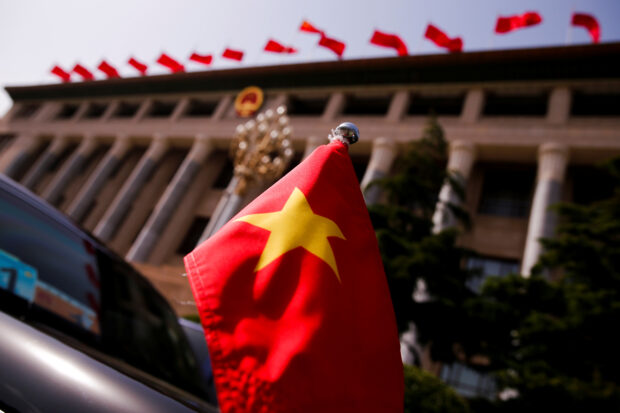
The Vietnamese national flag flies on a diplomatic car outside the Great Hall of the People in Beijing, China, May 12, 2017. REUTERS
BEIJING — China is willing to work with Vietnam to strengthen high-level communication and cooperation between their militaries, Chinese Defense Minister Li Shangfu said on Tuesday as he met his Vietnamese counterpart.
In their meeting in Beijing, Li said the international situation was chaotic and intertwined, and the security of the Asia-Pacific region was facing challenges, the Chinese defense ministry said in a statement.
“China and Vietnam should continue to work hand in hand and closely unite in the new journey of socialism, safeguard the common strategic interests of the two countries, and make positive contributions to regional peace and stability,” Li said in the talks with Vietnam’s defense minister, Phan Van Giang.
Li told Phan that relations between their militaries had developed well, adding that China’s military was willing to push relations to a new level.
Their meeting came after the USS Ronald Reagan made a stop in the Vietnamese port of Danang on Sunday – the third by a U.S. aircraft carrier since the end of the Vietnam War.
The U.S. navy visit comes amid tension between China and the United States in the South China Sea, most of which China claims, as the two powers jostle for influence in the energy-rich region.
In the past few weeks, Li has met South Africa’s defense force commander and Thailand’s army chief but he has not held talks with U.S. Defense Secretary Lloyd Austin.
Both Li and Austin attended a security summit in Singapore in early June but Li declined the offer of a meeting.
Li, appointed defense minister in March, is under U.S. sanctions over his role in a 2017 weapons purchase from Russia’s largest arms exporter. China has said it wants the sanctions dropped to facilitate discussions.
As tensions simmer in the South China Sea, where several countries have overlapping territorial claims and also hold military exercises in its waters, any thaw in Sino-U.S. military relations is being closely watched.
Beijing scrapped three major avenues of military communication with the United States in August last year in an angry response to a visit by then U.S. House Speaker Nancy Pelosi to self-ruled Taiwan.
RELATED STORIES